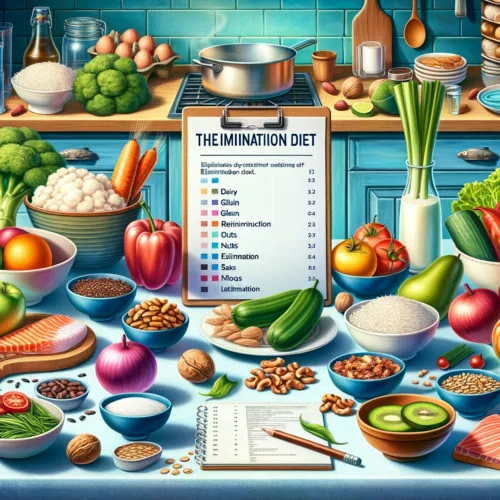Rational Nutrition: A Key Factor in Weight Loss and Reducing Belly Fat
Many men aim to lose weight and get rid of belly fat, and a diet for men plays a significant role in achieving this. Unlike women, men often can reach weight and fat goals through proper nutrition without the need for exercise. This article provides an example of a simple 1800-calorie diet for men and a detailed weekly menu for weight loss. It will cover dietary rules to help reduce belly fat and get rid of side fat.
| Pros of diet for men | Disadvantages of dieting for men |
|---|---|
| Improved overall health | Restricting dietary choices can be difficult to maintain. |
| Reducing the risk of disease | Risk of developing eating disorders. |
| Maintaining a Healthy Weight | Difficult to comply with in social situations. |
| Improving blood cholesterol levels | Not always suitable for achieving certain physical goals. |
| Helps in weight loss | Risk of deficiency of essential nutrients. |
| Promotes muscle gain | Limiting the consumption of certain foods. |
| Increases energy levels and stamina | |
| Helps you focus and improve productivity | |
| Improves athletic performance |
Simple Diet for Men
Adhering to a diet for men doesn’t necessarily mean a sharp reduction in caloric intake. It is more critical to focus on the diet’s composition and food choices. The glycemic index of food becomes crucial when studying proper weight loss nutrition. Physical workouts and sports can assist in weight loss, but they don’t burn a significant number of calories. For most men, it’s easier to stick to a diet and avoid harmful products than trying to burn belly fat through physical exercises.
Belly fat and side fat act as energy reserves. The body starts to use these reserves only in the case of calorie deficiency from food. Therefore, proper nutrition for weight loss involves controlling caloric intake. However, a diet for men isn’t merely about refusing the “three products that cause a beer belly” and switching to low-fat cottage cheese for two weeks. It requires a complete review of dietary habits, particularly eliminating fast food, fast carbs, and liquid calories like sweetened soft drinks, juices, and beer.
Physical activity, including workouts, is optional and not mandatory. You can achieve weight loss solely through a diet without exhausting yourself with running or other physical exercises. The main thing is to understand that progress will be gradual. Do not expect to lose 10 kilograms in three weeks. A realistic timeframe would be 2-3 months to achieve such a result.

Key Rules for Successful Weight Loss in a Diet for Men:
Breakfast and Lunch – Main Meals:
It’s crucial to get accustomed to having a full breakfast and avoid skipping it. Dedicate time for morning meals. Lunch should be balanced and nutritious to prevent snacking and overeating later in the day.
Limiting Carbs for Dinner:
The evening meal should be lighter and contain fewer carbs. It’s recommended to choose lean types of meat combined with a salad or green vegetables dressed with olive oil.
Avoid Sweet Consumption:
Studies show that sugar and sweet pastries are the main enemies of a healthy metabolism. They cause spikes in blood sugar levels, leading to constant hunger and the desire to consume more calories. The great news for men is that it’s much easier for them to completely give up sugar in their diet.
Learn to Feel Satiated:
Buffets and the habit of “all-inclusive” are adversaries of a slim figure. Learn the habit of controlling portion sizes, avoid add-ons, and leave the table feeling slightly hungry. Remember, the feeling of fullness comes around 20 minutes after eating.
Engage in Strength Training:
Losing excess weight isn’t as difficult as it seems. However, restoring muscles lost due to a sedentary lifestyle and shaping the body can be a more complicated task. If you want to feel as energetic as you did at 25, strength workouts will be your faithful companion. They will help not only to strengthen muscles but also to increase male hormones.

Diet for Men – Weekly Menu for Weight Loss:
The male weight loss program is based on a strategy where emphasis on morning nutrition is placed on fast carbs that help increase energy and overall body performance. The main meal, which includes the most carbohydrates, is recommended to be consumed at lunch, while dinner should focus on consuming a large amount of vegetables, lean meats, and beneficial plant fats.
Diet for Men – Understanding the Importance:
The diet should be balanced and varied. Moreover, it is recommended to drink an adequate amount of water, avoid excessive salt intake, and limit sugar and processed food consumption. Consulting with a nutritionist or a doctor can be beneficial in determining individual needs and devising the most effective eating plan.
Frequently Asked Questions
Men have a higher level of muscle mass and metabolism compared to women, which can contribute to weight reduction through proper nutrition without the necessity of intense physical activities.
Proper nutrition for men enables the control of caloric intake and prevents fat accumulation, particularly around the abdomen and sides.
The glycemic index of food assesses how quickly blood sugar levels rise after consuming a product. Managing the glycemic index can help control appetite and avoid sudden blood sugar fluctuations.
Sugar and sweet pastries can cause spikes in blood sugar levels and intensify feelings of hunger, which complicates weight loss and appetite control.
Strength training helps to strengthen muscles and increase metabolism, contributing to fat reduction and maintaining an optimal weight.
Recommendations include proper distribution of calories throughout meals, sugar and sweet food consumption control, and regular strength training to strengthen muscles and increase metabolism.
The main dietary principles for men aiming to reduce fat around the abdomen and sides include moderate calorie intake, focusing on balanced breakfasts and lunches, limiting carbohydrates at dinner, complete avoidance of sweets and fast food, and portion size control. Avoiding sugar and liquid calories such as sugary drinks is also crucial.















This insightful article emphasizes that effective weight loss for men goes beyond calorie counting; it’s about smart food choices and understanding the role of the glycemic index. Contrary to common belief, workouts alone don’t burn significant calories, making diet composition crucial. The focus is on dietary changes, steering away from harmful products, and controlling caloric intake. The article advocates a holistic approach, debunking myths about spot reduction and emphasizing the gradual, realistic nature of sustainable weight loss. A must-read for those seeking a balanced and achievable path to a healthier lifestyle.